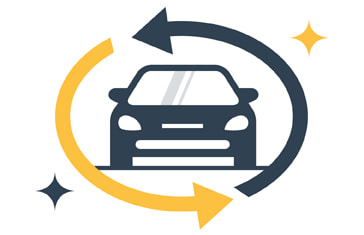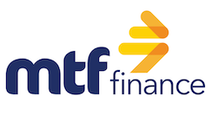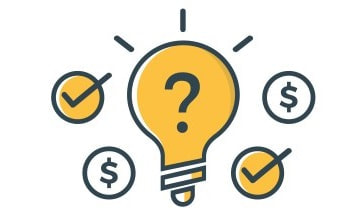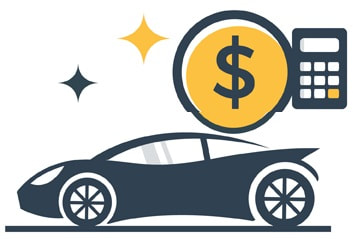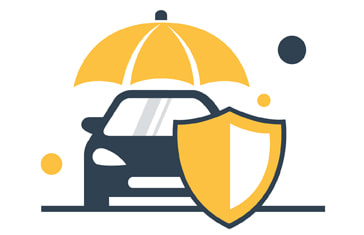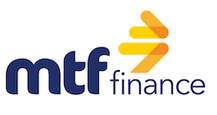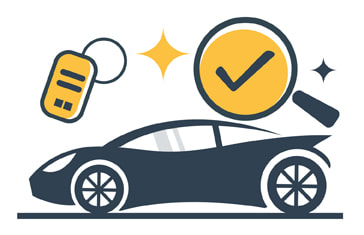Vehicle Leasing in 2024 - The Definitive New Zealand Guide
Whether you're leasing a car, ute or van, our guide explains the tax and business benefits, must-know facts and frequently asked questions.
Updated 1 February 2024
Confused by whether or not to lease a car or van? Our guide walks you through all the essential must-knows about vehicle leasing. We cover:
Know This First: Our dedicated guides to Operating Leases, Finance Leases and Operating Leases vs Financing Leases contain specific details around different funding options available beyond standard vehicle leasing contracts.
Are you looking to finance a business vehicle? Our business vehicle finance comparison has more information.
- What are the benefits of vehicle leasing?
- What do I need to be aware of when leasing a vehicle?
- Should I buy a vehicle outright, use finance or lease?
- Outlining the process of leasing a vehicle
- A typical vehicle lease example: Brian the Plumber
- Vehicle Leasing - Our Conclusion
Know This First: Our dedicated guides to Operating Leases, Finance Leases and Operating Leases vs Financing Leases contain specific details around different funding options available beyond standard vehicle leasing contracts.
Are you looking to finance a business vehicle? Our business vehicle finance comparison has more information.
What is vehicle leasing?
Vehicle leasing is a contract which allows a business to obtain a vehicle for a fixed period. The leasing company owns the vehicle and charges the business an agreed amount per month to use the vehicle. Usually, leases last for 12 to 48 months, but in some cases can be longer.
Once the lease ends, the business returns the vehicle. Leases are tax-deductible. Importantly there are two types of vehicle leases – operating leases and finance leases. This guide focuses primarily on operating leases.
Understanding Operating Leases
But there are some disadvantages:
Once the lease ends, the business returns the vehicle. Leases are tax-deductible. Importantly there are two types of vehicle leases – operating leases and finance leases. This guide focuses primarily on operating leases.
Understanding Operating Leases
- Operating leases represent the traditional fixed-term vehicle lease where the ownership remains with the leasing company.
- For example, a typical operating lease may be advertised as ‘36 months, 90,000km mileage and full warranty’. This means you’ll lease the car for three years and be contracted to drive less than 90,000 km.
- Operating leases have several advantages:
- The cost is 100% tax-deductible as an operating expense
- In most cases, the leasing company has the responsibility of maintaining the vehicle
- The contract appears ‘off-balance sheet’, meaning the remaining lease cost won’t appear as a liability on your accounts.
- You don’t need to borrow or invest a large amount of working capital to buy a vehicle outright, meaning you can use the free money on something productive.
- Lease payments are fixed and easy to budget for.
But there are some disadvantages:
- You must keep the vehicle in very good condition to avoid a ‘refurbishment charge’ when you return it at the end of the lease.
- You’re locked into a fixed term and fixed km allowance, so if your business needs a change you’ll need to re-negotiate the contract.
- In most cases, there are high termination fees if you wish to cancel before the end of the lease.
- Be aware that maintenance packages will most likely exclude tyre replacement. Replacing four tyres can be costly, so it's important to ask what tyre package is available (and negotiate a better one if necessary). A set of tyres generally lasts around 40,000 km, so if you have a 90,000 km mileage lease, this could cost an extra $2,000+ in tyre costs.
Alternative Option: Finance Leases
- A finance lease is similar to an operating lease with one key difference – at the end of the lease, the business leasing the vehicle owns it outright.
- You don’t need to borrow or invest a large amount of working capital to buy a vehicle outright, meaning you can use the free money on something productive.
- The monthly payments can work out to be cheaper than car finance
- The GST on the lease element can be claimed back
- Depreciation can also be expensed
But there are some disadvantages:
- The cost is not 100% tax-deductible, unlike an operating lease.
- The vehicle is treated as an asset on your balance sheet, and the unpaid amount appears as a liability.
- As the vehicle depreciates, your asset is worth less each year. You can expense the depreciation cost, but it’s still a cash loss.
|
Christopher Walsh
MoneyHub Founder |
Considering a new car purchase on finance as an alternative to leasing? Avoid costly mistakes with MoneyHub's Top Car Finance Options.
|
Our Three Trusted and Affordable Car Lenders Committed to Fast Quotes:
What are the Benefits of Vehicle Leasing?
Cars on New Zealand roads depreciate faster than any other country in the world, and car finance isn’t cheap either. Vehicle leasing has become increasingly popular as drivers look to save on vehicle costs. Unlike buying a car upfront, or paying for it on finance at high-interest rates, leasing is effectively the same as renting a car for anywhere between 12 and 48 months.
Benefits include:
Are you looking to finance a business vehicle? Our business vehicle finance comparison has more information.
Benefits include:
- Vehicle leases are similar to renting a home – you pay a deposit, agree on a term and to make regular monthly payments, and you hand over the keys when the lease term ends.
- Leasing companies offer new and used cars, most of which include cover for repairs and maintenance. New vehicle leases give you the ability to drive a new car every few years without the hassle of stumping up for repair costs should something go wrong. You also don’t need to muck around with selling you’re the car when you want to upgrade, nor are you stuck paying monthly costs until it’s paid off like you are with car finance.
- New leased cars come with a manufacturer’s warranty. Used leased cars often offer a period of repairs cover. This makes managing cash flow easier, especially if your existing vehicle is prone to needing repairs.
Are you looking to finance a business vehicle? Our business vehicle finance comparison has more information.
What do I need to be aware of when leasing a vehicle?
1. You’ll never own the vehicle
You’re essentially renting the vehicle for an agreed period. For example, if you lease 2020 Mazda 3 Limited for $500/month for 36 months, your total cost will be $18,000. A new Mazda 3 Limited retails for around $50,000. It’s up to you to decide if the ongoing cost provides good value for money.
2. You’ll need to pay for comprehensive insurance
Insurance costs are separate from your monthly lease cost. Our car insurance comparison explains how to save money.
3. Be aware of the condition the car needs to be returned in
To avoid service fees, you’ll need to be aware of the condition the leading company expects your to return the vehicle in. While a few marks are generally fine, it will need to be in a condition for easy re-sale.
4. Understand the financial obligations
Beyond the monthly lease payments, you'll need to be aware of late fees, early return fees and damage penalties, among others.
5. Be aware that mileage will be limited
All leases have a mileage limit - it doesn't apply per year but to the total term of the lease. If you return a car with 80,000 km added even though you agreed a 50,000 km lease, you will pay a penalty charge. Understand your mileage needs and don't under-estimate them when leasing a vehicle.
You’re essentially renting the vehicle for an agreed period. For example, if you lease 2020 Mazda 3 Limited for $500/month for 36 months, your total cost will be $18,000. A new Mazda 3 Limited retails for around $50,000. It’s up to you to decide if the ongoing cost provides good value for money.
2. You’ll need to pay for comprehensive insurance
Insurance costs are separate from your monthly lease cost. Our car insurance comparison explains how to save money.
3. Be aware of the condition the car needs to be returned in
To avoid service fees, you’ll need to be aware of the condition the leading company expects your to return the vehicle in. While a few marks are generally fine, it will need to be in a condition for easy re-sale.
4. Understand the financial obligations
Beyond the monthly lease payments, you'll need to be aware of late fees, early return fees and damage penalties, among others.
5. Be aware that mileage will be limited
All leases have a mileage limit - it doesn't apply per year but to the total term of the lease. If you return a car with 80,000 km added even though you agreed a 50,000 km lease, you will pay a penalty charge. Understand your mileage needs and don't under-estimate them when leasing a vehicle.
What types of vehicles can be leased?
There is a massive range on offer, although understandably the best selection will be found in Auckland, Wellington and Christchurch. Dozens of specialist companies offer leases for car, utes and vans.
Is vehicle leasing just for business owners and employees, or can I lease privately?
Vehicle leasing is tax-effective for companies who will claim the GST and deduct the monthly costs as a business expense and therefore lowering their company tax bill. For example, a plumber leasing a van will deduct the lease costs in the same way as their petrol costs, phone bill and marketing expenses.
For individuals considering a vehicle lease, there are few options to make it ‘tax-effective’. This means you won’t be able to deduct the GST (15%), nor the monthly cost from your income. But there are advantages for individuals leasing: You can drive a new car without losing money on depreciation.
If you don’t have the money upfront for a new car, leasing allows you to budget a monthly payment with no other costs (like car finance). You can also avoid maintenance costs and repairs by leasing when it includes maintenance.
For individuals considering a vehicle lease, there are few options to make it ‘tax-effective’. This means you won’t be able to deduct the GST (15%), nor the monthly cost from your income. But there are advantages for individuals leasing: You can drive a new car without losing money on depreciation.
If you don’t have the money upfront for a new car, leasing allows you to budget a monthly payment with no other costs (like car finance). You can also avoid maintenance costs and repairs by leasing when it includes maintenance.
Should I buy a vehicle outright, use finance or lease?
The answer is it depends on your personal circumstances. Leasing can be very cost-effective and free up cash. MoneyHub is often asked by users whether they should ‘lease or buy?’ If you decide to lease, there are many advantages:
But, if you do lease, there are restrictions on kilometres. And if the warranty expires during the lease, you’ll be liable to pay any repair costs. And remember, after your lease ends, you won’t own the car or have any right to continue to use it.
Many people favour leasing vehicles because it solves the ‘what should I do with my old car?’ question. Leasing means you just return the car, rather than trade it in. You’ll save time deciding how much is a ‘reasonable’ price, what to buy next and arranging financing if you don’t have all the money. It’s arguable that leasing is the best way to arrange a car, given the free-up of funds it offers as well as the risk-free commitment.
- Firstly, you won’t need to allocate precious capital to a heavily depreciating asset. The money you save can be directed to productive assets that boost revenue.
- Secondly, leasing gives cashflow certainty. You’ll pay a fixed amount which for all businesses is tax-deductible.
- Thirdly, many lease deals offer maintenance packages to protect you from repair costs.
But, if you do lease, there are restrictions on kilometres. And if the warranty expires during the lease, you’ll be liable to pay any repair costs. And remember, after your lease ends, you won’t own the car or have any right to continue to use it.
Many people favour leasing vehicles because it solves the ‘what should I do with my old car?’ question. Leasing means you just return the car, rather than trade it in. You’ll save time deciding how much is a ‘reasonable’ price, what to buy next and arranging financing if you don’t have all the money. It’s arguable that leasing is the best way to arrange a car, given the free-up of funds it offers as well as the risk-free commitment.
The Process of Leasing a Vehicle:
Leasing a car is a straightforward process, but you’ll need to know the steps along the way to ensure you get the most suitable deal. We explain the six standard steps for vehicle leasing below.
Step One: Work out what you can afford per monthThe best way to do this is to look at what you pay now on car finance costs, and if it’s affordable, then allocating something similar is a good idea. If you own your vehicle outright, you’ll need to talk to your accountant or finance manager to get an idea. If your company is profitable, operating lease costs are 100% tax-deductible.
We believe:
|
Step Three: Understand the pricing and obligations
|
Step Six: End of the contractIf you have a traditional operating lease, you’ll hand back the vehicle at the end of the lease term. When do you this, there may be additional charges to pay if:
If you have a finance lease, you’ll get ownership of the car once the value of residual balance owing is paid. You can do this by paying cash, arranging finance or trading the vehicle in for another vehicle. |
A Typical Vehicle Lease Example: Brian the Plumber
- Brian is driving a 2002 van which continues to break down. This costs him lost jobs and hefty repair bills.
- Brian knows he drives between 50,000 and 70,000 km every year and doesn’t have $30,000+ to buy a new van, nor a used one.
- He is looking at a lease for a new or used van and will sell his old van to cover the ongoing cost.
Brian had four options:
Option 1 – Buy a $30,000 new van from a local dealer or a $20,000 used van.
When making enquiries, Brian was offered $4,000 for his existing van. To buy the used van, he would have to get a loan for around $16,000 and this financing, at an interest rate, was going to cost about $535 per month. The used van has a one year guarantee.
Option 2 – Arrange an operating lease on a used van
Brian saw that he could get a 2012 Nissan van for $300+GST per month for three years, and he was offered a ‘fully maintained’ contract which covered mechanical breakdowns during the lease. Brian needed to put down $3,000 in advance to secure the lease (this money is usually arranged from selling the existing vehicle). All payments, including the advance, are income tax-deductible.
Option 3 – Arrange a finance lease on a new van
Brian found a 2019 Nissan van that would cost $35,000 and offered a three-year warranty.
The cost was $500 + GST per month on a 48-month term.
Brian needed to put down $8,000 in advance to secure the lease (this money is usually arranged from selling the existing vehicle). In this case, Brian’s van was only worth $4,000.
Option 4 – Keep the existing van
Brian can keep his current van, but there is no certainty how long it will last and how reliably it will run. Cancelling jobs affects Brian’s reputation and build a trusted reputation.
Lessons we can learn from Brian
- Operating leases can be more cost-effective than vehicle finance without the risks of breakdowns and mechanic costs.
- Operating lease costs are an operating expense that enjoy full tax deductibility.
- Brian, by selecting option 2, can arrange a reliable new vehicle for his business and focus on building his business knowing the risks are transferred to the leasing company.
|
Christopher Walsh
MoneyHub Founder |
Considering a new car purchase on finance as an alternative to leasing? Avoid costly mistakes with MoneyHub's Top Car Finance Options.
|
Our Three Trusted and Affordable Car Lenders Committed to Fast Quotes:
Vehicle Leasing - Our Conclusion
- Leasing a vehicle offers numerous benefits for your business. We believe that, for most business, is most often more affordable option than buying a vehicle outright.
- There are a number of tax benefits, and businesses avoid having a depreciating asset sitting on the balance sheet. The cash freed up by paying a monthly expense rather than an entire debt limits business risk. It also allows a business to put the money towards growing their profits.
- Operating and finance leases provide cashflow certainty and remove the risks that come with vehicle ownership. Leases also minimise time spent on making decisions about vehicle disposal.
- Every business is different, so make your vehicle leasing decision carefully.
Car leasing companies:
Car Finance:
Business Lending and Finance:
Related Guides:
Car Finance:
Business Lending and Finance:
- Business Loan Calculator
- Compare Business Loans
- Business Borrowing Options
- Small Business Loans
- Operating Leases
- Finance Leases
- Operating Leases vs Financing Leases
- Prospa Business Loans Review
- Bizcap Business Loans Review
Related Guides:

